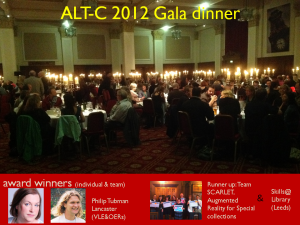Attending our annual professional conference, the Association for Learning Technology Conference (ALT-C), was special for two reasons this year. For one, this was the first time I was involved in presenting, and secondly, I was co-presenting with Jaye McIsaac, our colleague from Educational Development (see Jaye’s blog entry of the even here).

Our presentations involved a student evaluation method which we have been using successfully for curriculum and module evaluation for a number of years now. The technological relevance was that we tried a number of technologies to see whether we can improve on the process, called the Nominal Group Technique. (Slideshare links here to our presentation & demonstration.)
One of the most useful aspects of the conference is to be able to chat to other institutions and see what they are up to. Having seen plenty of engaging presentations, credit must go to our academic staff at the University of Liverpool, many of whom who could have been there presenting their innovative e-learning practices at ALT-C. In fact, if you are one of them – do consider presenting at ALT-C in 2013! The eLearning Unit can support you with the process.

My personal highlights
My highlights included (hard to keep list short):
- Eric Mazur on active learning – covering how to work the lectures so that they reduce gender bias, ‘confusion’ as a sign of learning (i.e. if students are confused, it is a good sign that they are learning), and the ‘usefulness’ of demonstrations in science lectures.
- Attending and presenting together with my colleague, Jaye McIsaac, as this brought a fresh perspective on what ALT is and why it’s useful.
- The Digital Literacies projects presentations, including a session by Helen Beetham and others on ‘Tools of the Digital Trade’.
- Getting to know the Pecha Kucha format (at ALT, it’s 9 slides with 45 seconds each).
- A presentation on ‘session capture‘ , with the idea that through extending the naming from ‘lecture capture’ to ‘session capture’, comes the extension possibilities of using recordings in many more settings, such as induction activities, aiding a more institution-wide take-up of the practice. (Loughbourough has Echo360.)
- The London JISC project, Generation 4.5, which uses virtual patients through multi-branching PBL (problem-based learning) scenarios.
Tools & tips
As usual, there are always tools or tips to pick up. Just out of interest, the trendy tool of the conference was the Instagram app that everyone seem to be using (see first image of this blogpost).
- ScoopIt – a curation service which colleates content from blogs and other web resources on a given topic, e.g. see a ScoopIt for ALTC2012.
- Articulate Storyline – an (according to the presenters) exciting e-learning authoring software which has Flash-like capability for animations.
- Twitter tool – which combines twitter feeds in a PowerPoint.
- Mobile Xerte
- Khan Academy: free videos on various topics.
- Clapometer: a tool that measures the applause level of an audience (one lecturer uses it as a fun alternative to a clicker indicating best response from students).
- YouTube wraps: a tool that allows you to tailor an existing YouTube resource.
and finally, the awards:

I have never made it to the ALT Gala dinner before. It was inspiring to see the best of the profession receiving awards and recognition for their work.
One of the Learning Technologist of 2012 awards went to a close neighbour, Philip Taubman, Lancaster University, for his work on Open Educational Resources and their VLE. The runner up team award (joint second place) was awarded to the SCARLET team at Manchester for ‘their excellent development and implementation of the pioneering SCARLET Augmented Reality (AR) toolkit’ – enhancing learner engagement with artefacts and bring library special collections to life – and for Skills@Library, University of Leeds, for ‘their outstanding development and implementation of internationally recognised open e-learning resources’.
At ALT-C, prizes are also awarded for the Best Proceedings papers, which for the second year in a row was given to Tom Cochrane, this time for his paper on “Secrets of mlearning failures: confronting reality“. The two best Pecha Kucha Presentations were: “Transforming Learning Technologists into Design Researchers“ by Brenda Bannan, and “Engagement by stealth: Can a PG Cert get teachers excited about tech?“ by Lindsay Jordan who dressed as a miner for this: ‘at the coalface’.
So overall, a really good conference – and here at the eLearning Unit we have hatched plans for presenting at ALT-C 2013 as a team.
Tünde (Varga-Atkins)